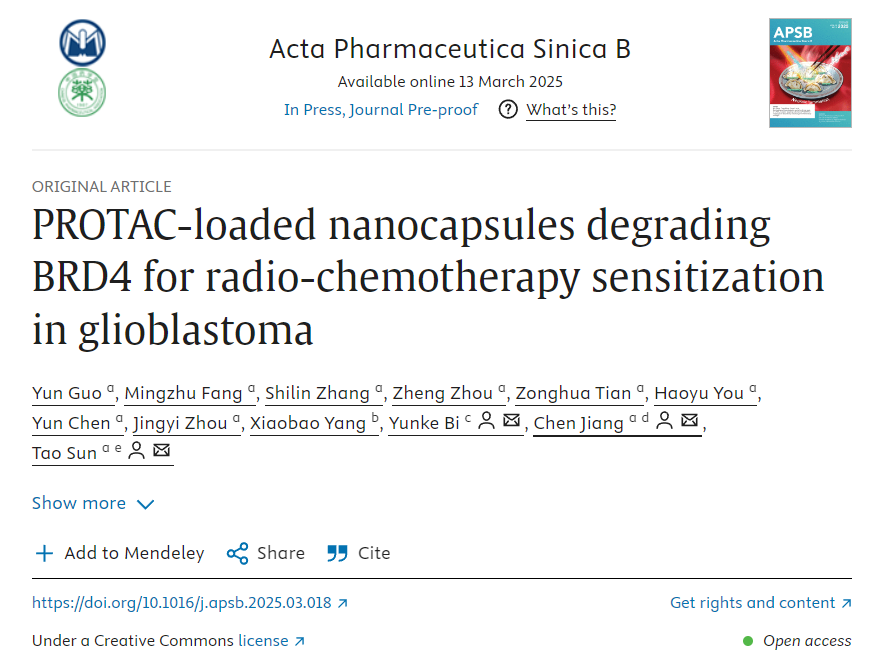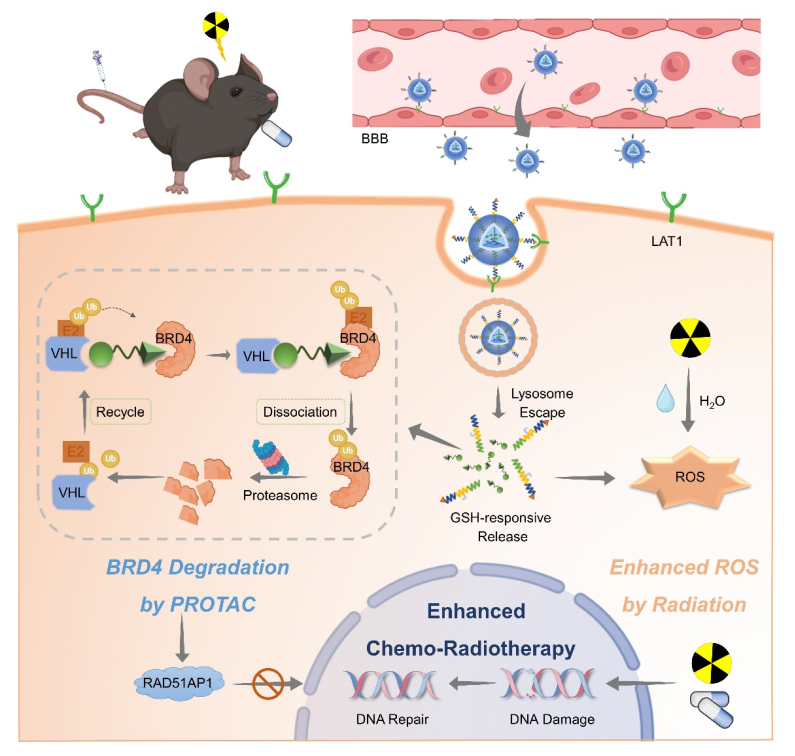Gluetacs Therapeutics and Fudan University’s Sun Tao/Jiang Chen team develop a PROTAC-loaded nanocapsule targeting BRD4 degradation to break through the radiochemotherapy resistance bottleneck in glioblastoma
发布日期:2025-3-15 文章来源:标新生物
Glioblastoma (GBM) is the most malignant primary brain tumor, characterized by short patient survival and high recurrence rates. Traditional radiochemotherapy is limited in efficacy due to the blood-brain barrier (BBB) barrier, activation of DNA damage repair, and tumor resistance. The BRD4 protein, a key regulator of tumor growth and DNA repair, has become a therapeutic challenge due to the lack of effective small-molecule inhibitors. PROTAC technology can efficiently degrade BRD4, but further improvements are needed to address its poor in vivo targeting and potential systemic toxicity.

Gluetacs Therapeutics in collaboration with the the team led by Professor Sun Tao/Professor Jiang Chen from Fudan University innovatively designed a GSH-responsive nanocapsule that successfully delivers the PROTAC molecule (SIS) with precision. The nanocapsule, surface-modified with 1-methyl-L-tryptophan (MLT), targets the highly expressed LAT1 transporter in brain tumors, penetrates the BBB, and accumulates in tumor tissues. Triggered by the high concentration of glutathione (GSH) in the tumor microenvironment, it rapidly releases SIS, which degrades the BRD4 protein via the ubiquitin-proteasome system, blocking the DNA damage repair pathway. Meanwhile, the nanocapsule consumes GSH to disrupt the redox balance, enhancing the level of reactive oxygen species (ROS) induced by radiotherapy and further amplifying the DNA damage effect.
This nanocapsule, with its GBM targeting and GSH-responsive drug release properties, can precisely release the drug in the tumor microenvironment, inhibit DNA damage repair, and thereby enhance the efficacy of radiotherapy and chemotherapy. This strategy not only improves therapeutic outcomes but also reduces systemic toxicity, offering a new direction for future brain tumor treatment. The results were published online in the internationally renowned journal Acta Pharmaceutica Sinica B under the title “PROTAC-loaded nanocapsules degrading BRD4 for radio-chemotherapy sensitization in glioblastoma.”
Research Highlights:
(1)Dual-sensitization mechanism: Degradation of BRD4 inhibits DNA repair + enhanced ROS boosts radiotherapy efficacy, significantly enhancing the synergistic effect of TMZ chemotherapy and radiotherapy.
(2)Precise targeting delivery: In vivo experiments showed that MLT modification increased the accumulation of nanocapsules in brain tumor tissues by three times compared to the non-targeted group, with significant reduction in liver accumulation.
(3)High efficacy and low toxicity: Combined treatment extended the survival of tumor-bearing mice to 24 days (compared to 16 days in the control group), with no visible toxicity in major organs and normal biochemical blood indicators.

This study provides a novel nanodelivery strategy for the clinical translation of PROTAC technology, achieving for the first time the tumor-specific degradation of BRD4 and synergistic regulation of radiochemotherapy sensitization, opening a new direction for the treatment of malignant brain tumors. Guo Yun, a master’s student at the School of Pharmacy, Fudan University, is the first author of the paper. Associate Professor Sun Tao and Professor Jiang Chen from the School of Pharmacy, Fudan University, are the co-corresponding authors, and Gluetacs Therapeutics is a cooperative unit. The research was supported by the National Natural Science Foundation of China, the National Key Research and Development Program, the Shanghai Science and Technology Major Project, and the Zhangjiang Laboratory.